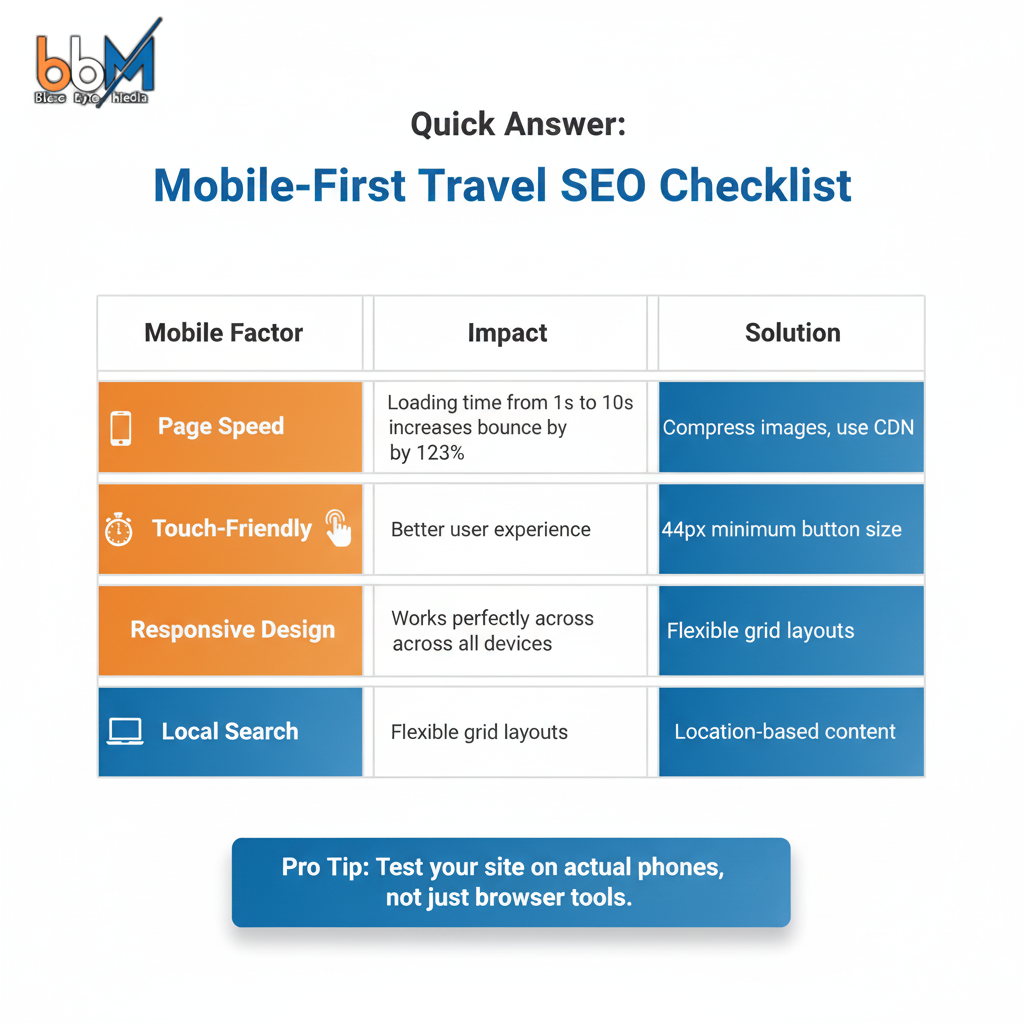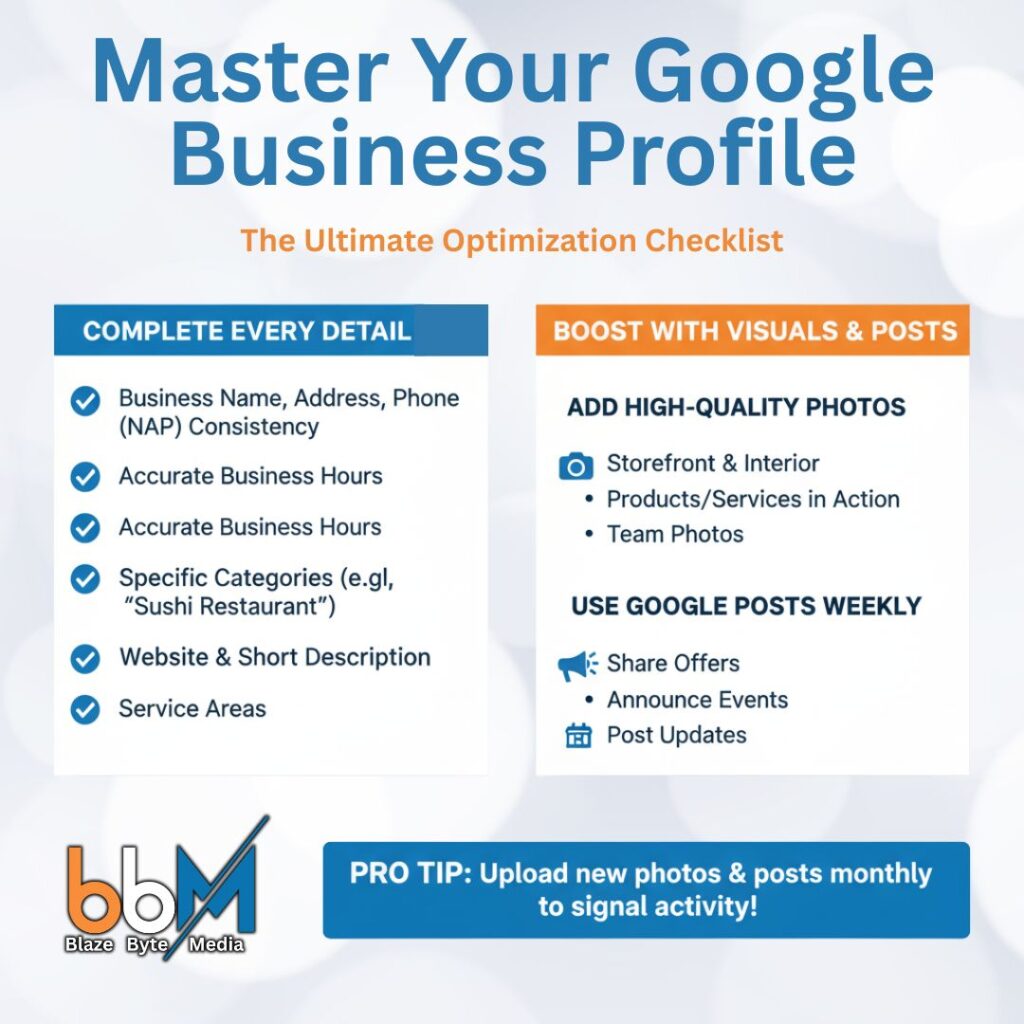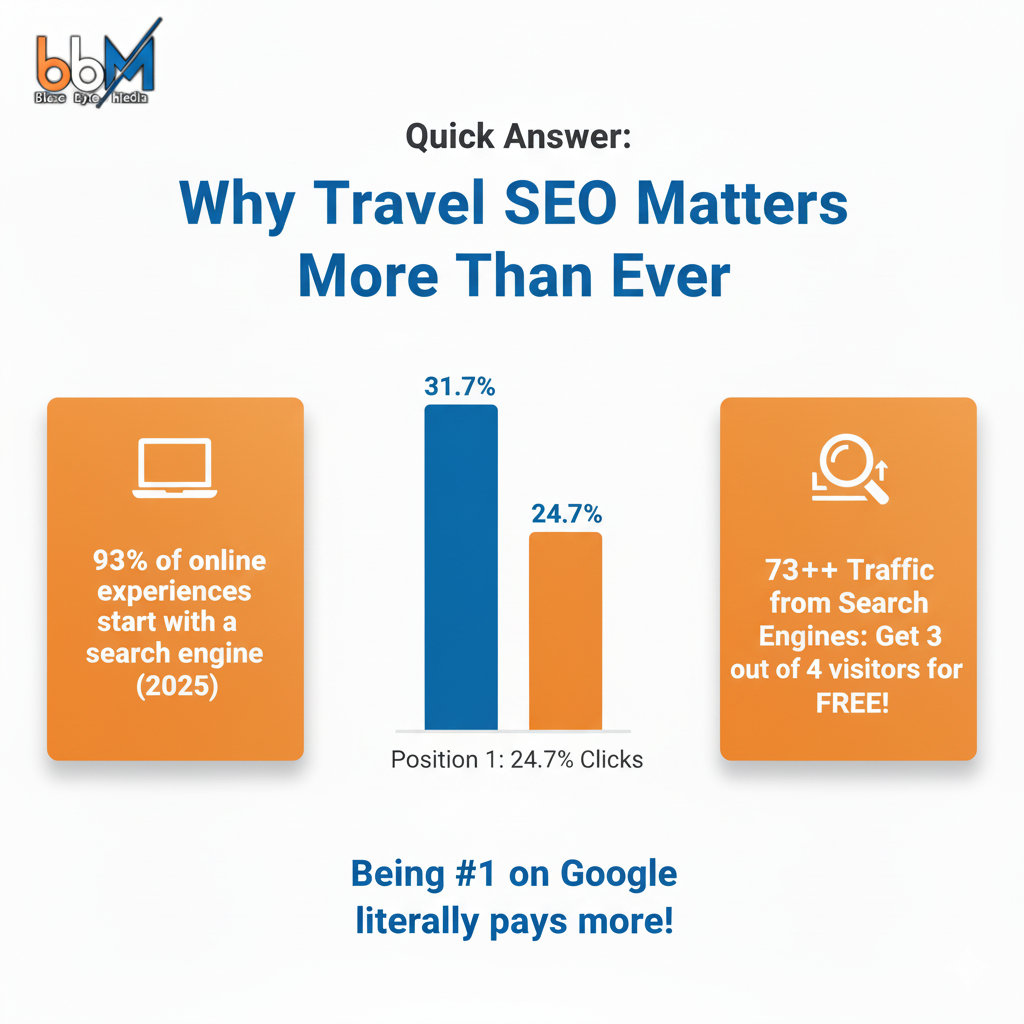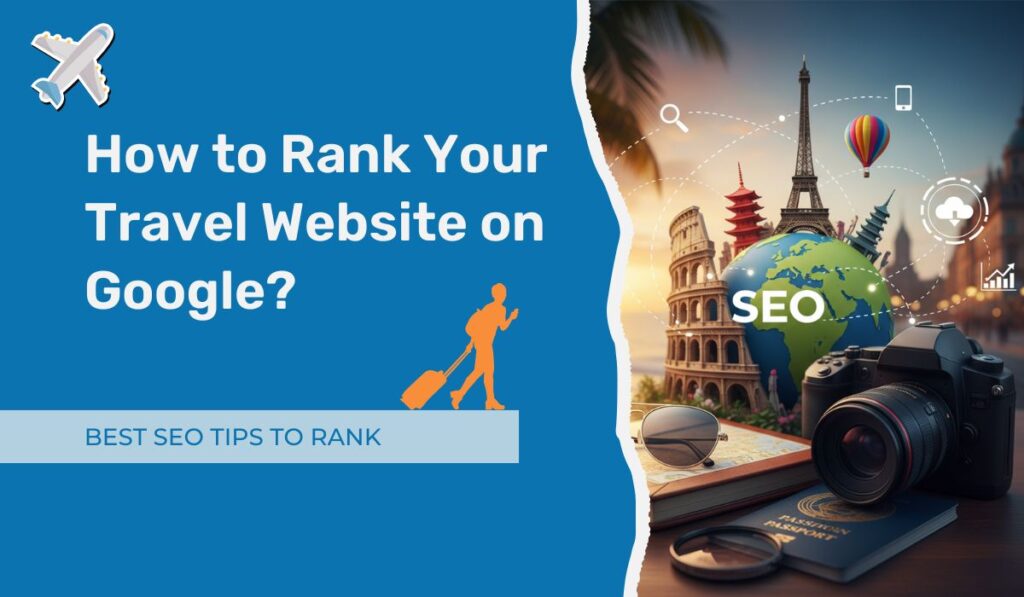Travel website SEO is the secret weapon that transforms hidden gems into booking magnets. In 2025, 93% of online experiences start with a search engine, making Google ranking crucial for your travel business success. This guide reveals proven strategies that helped our clients at Blaze Byte Media achieve 100% ranking improvements in just 3 months.
Quick Answer: Top 5 Travel SEO Must-Dos
- Mobile-first optimization (65% of searches are mobile)
- Page speed under 3 seconds (reduces 123% bounce rate)
- Local SEO setup with Google Business Profile
- High-quality destination content with user intent
- Schema markup for rich snippets
Why Travel SEO Matters More Than Ever
The travel industry is booming! The online travel market is projected to reach $1,063 billion by 2028, but here’s the catch – the first Google result gets 31.7% of clicks, while position 2 gets only 24.7%. That means being #1 on Google literally pays more than being #2.
Fun fact: Some travel brands see over 73% of their traffic coming from search engines. Imagine getting 3 out of 4 visitors for free instead of paying for ads!
1. Master Mobile-First Travel SEO
Why Mobile Matters for Travel Sites
Travel website mobile optimization isn’t optional anymore. 65.89% of global organic searches happen on mobile devices, and travelers especially love browsing destinations on their phones during commutes or lunch breaks.
Mobile SEO Checklist:
| Mobile Factor | Impact | Solution |
|---|---|---|
| Page Speed | Loading time from 1s to 10s increases bounce by 123% | Compress images, use CDN |
| Touch-Friendly | Better user experience | 44px minimum button size |
| Responsive Design | Works perfectly across all devices | Flexible grid layouts |
| Local Search | “Near me” searches | Location-based content |
Pro Tip: Test your site on actual phones, not just browser tools. Real users scroll differently than developers!

2. Speed Up Your Travel Website
The Need for Speed in Travel SEO
Website speed optimization can make or break your bookings. Aim for page load times under 3 seconds because travel planners are impatient – they’re dreaming of their next adventure, not waiting for slow pages.
Speed Optimization Tactics:
- Image compression: Travel sites are image-heavy, so compress those stunning destination photos
- Lazy loading: Load images only when visitors scroll to them
- Caching: Store frequently accessed data locally
- CDN usage: Serve content from servers closest to your visitors
Speed Test Tools:
- Google PageSpeed Insights
- GTmetrix
- Pingdom
- WebPageTest
3. Keyword Research for Travel Websites
Understanding Travel Search Intent
Travel keyword research requires thinking like a traveler. People search differently for “best time to visit Japan” (informational) versus “Tokyo hotel bookings” (transactional).
Travel Keyword Types:
| Intent Type | Example Keywords | Content Strategy |
|---|---|---|
| Informational | “best time visit Bali” | Travel guides, tips |
| Commercial | “Bali tour packages” | Comparison pages |
| Transactional | “book Bali hotel” | Booking pages |
| Local | “restaurants near me Ubud” | Local guides |
Long-Tail Keyword Magic
Instead of competing for “Vietnamese food,” target “best Vietnamese dishes to try” – it’s easier to rank and attracts ready-to-book travelers.
Keyword Research Tools:
- Google Keyword Planner
- Semrush
- Ahrefs
- AnswerThePublic
4. Create Content That Converts Travelers
Content Strategy for Travel SEO
High-quality travel content means solving real traveler problems. Craft informative content that aligns with user intent – think “how to avoid tourist traps in Paris” instead of generic destination descriptions.
Content Types That Rank:
- Destination Guides: Complete city/country overviews
- Itineraries: Day-by-day travel plans
- Budget Guides: Cost breakdowns for destinations
- Travel Tips: Practical advice for specific locations
- Local Experiences: Unique activities and hidden gems
Content Optimization Formula:
- Headline: Include target keyword and emotion
- Introduction: Answer the main question quickly
- Structure: Use H2/H3 headings with keywords
- Images: Alt text with location keywords
- Internal links: Connect related destinations
- Call-to-action: Clear next steps for bookings
5. Technical SEO for Travel Websites
Schema Markup for Rich Snippets
Schema markup helps Google understand your travel content better and can earn you those eye-catching rich snippets.
Essential Schema Types for Travel:
- LocalBusiness: For tour operators
- Event: For travel events and tours
- Review: For destination reviews
- FAQPage: For common travel questions
- Article: For travel blog posts
Site Architecture Best Practices:
Homepage
├── Destinations
│ ├── Asia
│ │ ├── Japan
│ │ │ ├── Tokyo Guide
│ │ │ └── Tokyo Tours
│ │ └── Thailand
│ └── Europe
├── Tours & Activities
└── Travel Tips
Internal Linking Strategy: Link destination guides to related tours, accommodation, and activities. This keeps travelers on your site longer and helps Google understand your content relationships.
6. Local SEO for Travel Businesses
Google Business Profile Optimization
Local travel SEO starts with claiming and optimizing your Google Business Profile. Ensure your business name, address, and phone number (NAP) are accurate and consistent across the web.
Local SEO Checklist:
- ✅ Complete Google Business Profile
- ✅ Local keywords in content
- ✅ Local business directories
- ✅ Customer reviews management
- ✅ Location-specific landing pages

Review Management Strategy:
Encourage happy travelers to leave Google reviews. Respond to all reviews professionally – even negative ones. This shows potential customers you care about their experience.
7. Link Building for Travel Websites
Earning Quality Backlinks
Travel link building works best through relationship building and creating link-worthy content.
Link Building Opportunities:
| Source Type | Strategy | Example |
|---|---|---|
| Travel Bloggers | Guest posts, collaborations | Write for popular travel blogs |
| Tourism Boards | Partnerships | Official destination partnerships |
| Local Businesses | Cross-promotion | Partner with hotels, restaurants |
| Media Outlets | Press releases | Share unique travel stories |
| Industry Sites | Resource pages | Get listed in “best of” lists |
Content That Attracts Links:
- Original travel research and surveys
- Comprehensive destination guides
- Unique travel photography
- Interactive travel tools (calculators, maps)
- Travel industry reports
8. Measuring Travel SEO Success
Key Performance Indicators (KPIs)
Track these metrics to measure your travel SEO performance:
Essential SEO Metrics:
| Metric | Why It Matters | Target |
|---|---|---|
| Organic Traffic | Overall SEO health | 20%+ monthly growth |
| Keyword Rankings | Visibility improvement | Top 10 positions |
| Conversion Rate | Revenue impact | 2-5% for travel |
| Bounce Rate | Content quality | <60% for travel sites |
| Page Load Speed | User experience | <3 seconds |
SEO Tools for Tracking:
- Google Analytics 4: Traffic and conversions
- Google Search Console: Keyword performance
- Semrush: Competitor analysis
- Ahrefs: Backlink monitoring
9. Common Travel SEO Mistakes to Avoid
SEO Pitfalls That Kill Rankings
Even experienced travel marketers make these travel SEO mistakes:
- Duplicate Content: Same description for multiple destinations
- Keyword Stuffing: Overusing “best travel destination” everywhere
- Ignoring Mobile: Not optimizing for phone users
- Slow Loading: Heavy images without compression
- No Local SEO: Missing Google Business Profile setup
- Poor URL Structure: Using random numbers instead of descriptive URLs
- Missing Alt Text: Images without descriptive text
- No Internal Linking: Isolated pages that don’t connect
Quick Fix Solutions:
- Unique Content: Write original descriptions for each destination
- Natural Keywords: Use synonyms and related terms
- Mobile Testing: Check site on real devices
- Image Optimization: Compress and resize photos
- Speed Optimization: Use caching and CDN

10. Future of Travel SEO in 2025
Emerging Trends to Watch
Travel SEO trends 2025 are shaping how travelers discover destinations:
Key Developments:
- AI Search: ChatGPT and Perplexity changing search behavior
- Voice Search: “Hey Google, plan my Italy trip”
- Visual Search: Photo-based destination discovery
- Sustainability Focus: Eco-friendly travel content ranking higher
- Micro-Moments: Quick answers for travel decisions
Preparing for AI Search:
- Create comprehensive, factual content
- Use structured data markup
- Answer specific travel questions
- Focus on helpful, unique insights
- Build topical authority in specific destinations
Ready to Dominate Travel Search Results?
Travel website SEO success requires consistent effort and the right strategy. Only 33% of websites pass Core Web Vitals, which means huge opportunities for travel sites that get technical SEO right.
Your Next Steps:
- Audit your current site using Google Search Console
- Fix technical issues (speed, mobile, schema)
- Create content calendar targeting travel keywords
- Build local citations and Google Business Profile
- Monitor and adjust based on performance data
Need Expert Help?
At Blaze Byte Media, we’ve helped travel businesses achieve 100% ranking improvements in 3 months. Our specialized SEO, AEO, and GEO services start at $199 for international clients.
Get your free travel SEO audit: Contact us at [email protected] or visit blazebytemedia.com to discover your ranking opportunities.
Frequently Asked Questions
Q: How long does travel SEO take to work? A: Most travel websites see initial improvements in 3-6 months, with significant results by month 6-12. Our clients typically see 100% ranking improvements within 3 months.
Q: Should I target broad keywords like “travel” or specific ones? A: Focus on specific, long-tail keywords like “best time to visit Japan in spring” rather than broad terms like “travel.” They’re easier to rank for and attract more qualified traffic.
Q: How important are reviews for travel SEO? A: Extremely important! Reviews improve local SEO rankings and provide fresh, user-generated content that Google loves.
Q: Can I do travel SEO myself or need an agency? A: Basic SEO can be done yourself, but competitive travel niches often require professional expertise to outrank established players.
Q: What’s the biggest travel SEO mistake to avoid? A: Duplicate content across multiple destinations. Each location needs unique, valuable content to rank well.
Remember: Great travel SEO doesn’t just drive traffic – it attracts travelers ready to book their next adventure! 🌍✈️

